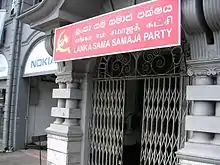Socialism in Sri Lanka
Socialism in Sri Lanka or Sri Lankan socialism is a political philosophy that is shared by various political parties of the country. Socialist parties, especially the Trotskyist Lanka Sama Samaja Party, have played a major role in the country's history from the time of the Sri Lankan Independence movement.[1] Socialist ideology shaped the principal economic and social policies of Sirimavo Bandaranaike and the Sri Lanka Freedom Party during the 1970s.[2] Several sectors of the economy including banking, insurance and some privately owned estates were nationalized during her tenure. Bread and several esstential items were rationed by the government at the time.[2][3]
_5.PNG.webp)
| Part of a series on |
| Socialism |
|---|
 |
|
Janatha Vimukthi Peramuna
Janatha Vimukthi Peramuna is a communist and Marxist–Leninist party and political movement in Sri Lanka. The movement was involved in two armed uprisings in Sri Lanka however they entered into the democractic process in 1994.[4][5]

Lanka Sama Samaja Party
Lanka Sama Samaja Party is a Trotskyist political party in Sri Lanka who played a major role in the independence movement of Sri Lanka.[6]
Sri Lanka Freedom Party
Sri Lanka Freedom Party is one of the major and most well known political parties in Sri Lanka. It was founded by S. W. R. D. Bandaranaike. After independence, the SLFP represented a form of non-revolutionary populist socialism and a policy of non-alignment with strong ties to socialist countries.[7][8][9] However, after 1995 the party moved towards a more social democratic philosophy that sought to combine both the free market and the SLFP's traditional people friendly policies.[10][11]
Notes
- https://socialistaction.org/2018/08/12/the-day-trotskyists-shut-down-a-country-65th-anniversary-of-the-sri-lankan-hartal/
- https://www.theguardian.com/theguardian/2013/jul/22/bandaranaike-first-woman-prime-minister
- https://www.nytimes.com/1974/05/13/archives/sri-lanka-short-of-food-faces-an-economic-crisis-people-are-well.html
- http://news.bbc.co.uk/2/hi/south_asia/1673208.stm
- http://www.island.lk/index.php?page_cat=article-details&page=article-details&code_title=63193
- https://www.marxists.org/history/etol/writers/alex/works/in_trot/cey1_1.htm
- https://www.nytimes.com/1975/10/13/archives/sri-lanka-economy-ailing-pushes-nationalization-us-suspended-aid.html
- https://www.nytimes.com/1982/10/20/world/election-in-sri-lanka-capitalism-versus-socialism.html
- http://infolanka.asia/sri-lanka/people/the-foreign-policy-of-sirimavo-bandaranaike/the-colombo-powers-and-the-sino-indian-war-of-1962
- http://archives.dailynews.lk/2005/08/18/pol03.htm
- https://www.g-l-f.org/index.cfm?id=82368
